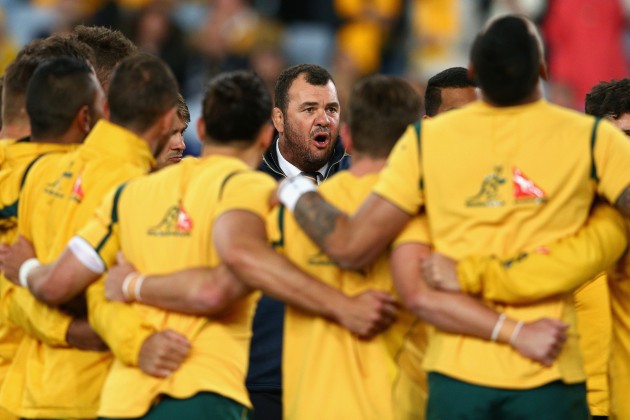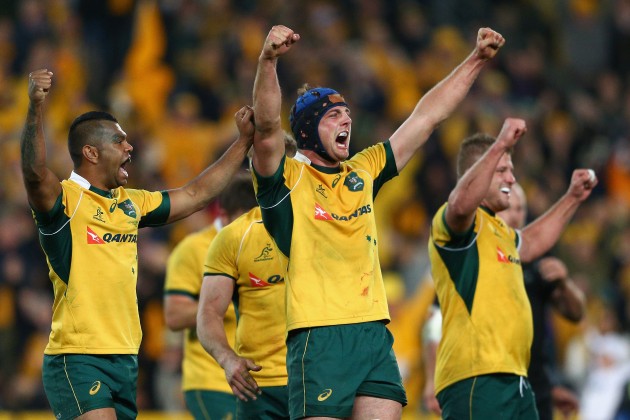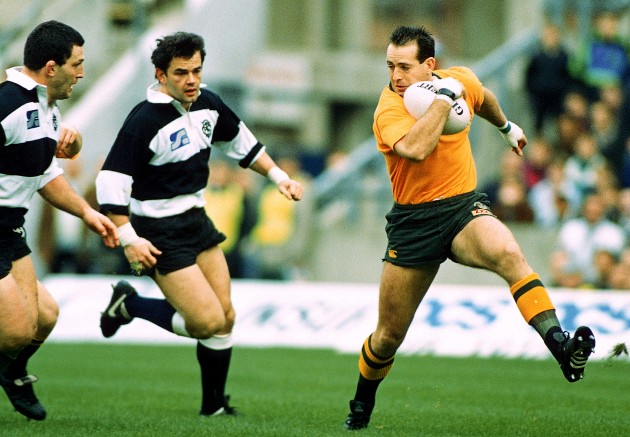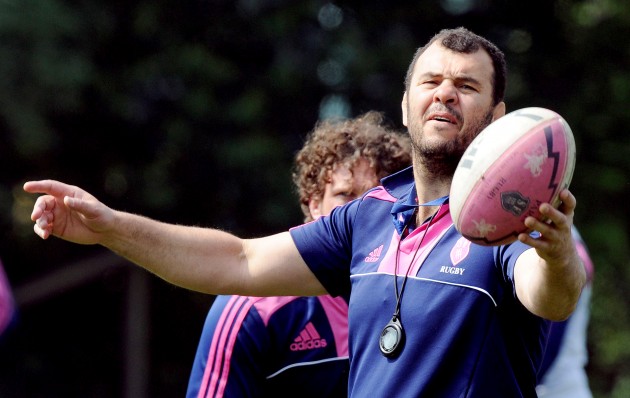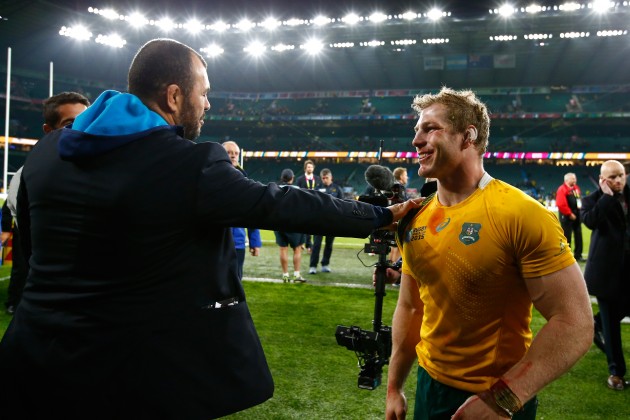Fluent in four languages, a friend of fashion designers and a successful businessman – there’s more to Australia coach Michael Cheika than meets the eye… This feature first appeared in the October 2015 issue of Rugby World.
FOR SOMEONE who never saw himself as a coach (Wallaby icon David Campese first suggested him for a job) and doesn’t need to coach (he’s a self-made millionaire), Michael Cheika has proved a damn successful one.
He’s the only coach to win a premier club competition in both hemispheres, guiding Leinster to their first Heineken Cup title in 2009 and the Waratahs to Super Rugby glory in 2014, while last month Australia won the Rugby Championship less than a year after he took charge of the team, beating New Zealand for the first time in 11 attempts in the process.
Cheika is not one to sing his own praises. He won’t even pick out a coaching highlight, preferring to focus on the next challenge and insisting retirement is when you look back on what you’ve achieved. However, a look at his background and coaching style provides an insight into why he’s been so successful…
ON TREND
A rampaging No 8 for Randwick, Cheika also turned out for clubs in Italy and France during the late Eighties and early Nineties, “playing all year round”. There came a point, however, when he wanted to spend more time at home in Australia and needed to get a job.
He hadn’t gone on to higher education after leaving school but had family who worked in the fashion industry and found out that Australian designer Collette Dinnigan was looking for someone who could speak French and Italian. He may not have been a keen follower of clothing trends but his language skills – as the son of Lebanese immigrants he can speak Arabic as well as English, French and Italian – meant he was the perfect fit. “I ran the business side of things – logistics, finance, all the normal stuff you have in any business,” he explains. “They’re not all creatives!”
After that initial break, Cheika went on to work for another designer before setting up his own clothing company, Live Fashion, which has proved very profitable. In the meantime, former team-mate Campese got in touch to ask whether he fancied a coaching gig in Padova, his fluency in Italian again a key factor.
“I was working for Collette at the time and was still playing here in Sydney,” he recalls. “Campo asked if I’d be interested in coaching in Italy as he knew I spoke the language. I’d never thought about coaching but I said, ‘Why not? I enjoy rugby and could test myself in a different environment. If I like it, I’ll keep doing it.’ And I had a great time in Padova. It worked for me.”
NORTH v SOUTH
Padova was the start of his coaching journey but there have been several stops since in both hemispheres. And it’s not just his rugby experience that has helped him as a coach – he’s also drawn on his business background. “People management and personal skills are key. Whether in business or sport, you’re just looking to get the best out of people. I have experience of doing that with my own business and rugby. You learn how to handle people to get the best out of them.”
It’s the man-management that Test centurion George Smith sees as Cheika’s greatest strength. Wasps’ new flanker worked with Cheika at Stade Français and has also been in touch with the coach to discuss his World Cup availability. Smith says: “I find Cheiks to be a very good man-manager. He has the utmost respect for players and understands them on and off the field.
He has a good feeling for that aspect of management.
“I enjoyed his coaching style. He’s the type of person who will give you constructive advice. In my experience, he’s very measured and thinks carefully about what he’s going to say. He doesn’t shoot from the hip.”
That has not always been the case. Cheika was very vocal about his displeasure at refereeing decisions when a late Harlequins try cost Stade the European Challenge Cup title in 2011 – he was fined for verbally abusing officials – and Shane Jennings has spoken of how he would go “f***ing bananas” if Leinster underperformed. Yet he has always been able to inspire his teams.
As Brian O’Driscoll told Rugby World a few years ago: “What amazed me was, after five years as coach, his team talks never became repetitive. He was always able to captivate his audience and that’s not easy with a long tenure. He’s a very good coach and a very good speaker.”
The praise may be plentiful, particularly from those at Leinster who saw him transform the province from perennial underachievers to European champions, but there was still an element of self–doubt when he returned Down Under in 2013. Could the tactics employed in Europe prove as effective in Super Rugby?
“I was petrified when I came back to coach the Waratahs because I’d never coached at that level in the southern hemisphere,” he admits. “I’d seen games on TV and they looked pretty different, and I wasn’t sure if what I had in my kitbag would work. I learnt pretty quickly and (assistant coach) Daryl Gibson showed me what was required in Super Rugby. Nathan Grey helped me as well because he was experienced in Super Rugby. Test level is a different challenge again now.”
THE ULTIMATE TEST
Cheika was named Australia coach last October following Ewen McKenzie’s resignation and was thrust straight into an end-of-year tour. After guiding the Waratahs to the Super Rugby play-offs again this year, he has taken the Australia reins full-time and has quickly put his unique imprint on things.
Take the decision for the coaching team to line up alongside their players for the anthem ahead of the Rugby Championship decider against the All Blacks – an extremely unfamiliar sight. It’s a quirk they repeated the following week, when they lost 41-13 to the world champions. We’ll have to wait to see whether they continue the display of solidarity during the World Cup but Cheika says: “It was a last-minute decision. I wanted my team to feel like we were with them, that we weren’t judging them. It worked out to be a great experience.”
Another example of Cheika doing things differently is his World Cup squad selection, going against the norm by selecting only two specialist hookers and scrum-halves. It’s been called a calculated risk and the hooker call, in particular, has raised a few eyebrows. Still, there have been notable improvements in the scrum for Australia, although Cheika is quick to play down such talk ahead of their tussles in Pool A.
“I don’t think England and Wales will be worried about our scrum. It’s up to us to improve in that area and be up for the battle. I still think teams over there will see it as a big weakness of ours and will target us.”
One area where Cheika has been consistent throughout his career is his desire to play an entertaining, ball-in-hand game. The Wallabies have a plethora of playmakers and with players like Israel Folau, Quade Cooper and Matt Giteau in the squad, it’s a strategy that makes sense. The difficulty has been trying to unpick the more organised defences on the international stage.
“I’ve always played a running style of game, a very attacking style of game, but obviously it becomes more and more difficult at Test level. There are much better defenders and less holes to get into, so you can run up dark alleys. The challenge is to get variation in the way we play and get the guys enjoying that style.
“We’ve had a good period of time training together and have been improving – and we should be improving, otherwise I wouldn’t be doing my job. I’m happy that as a group we’re enjoying ourselves and are getting better together.”
Whatever happens during this World Cup, Cheika is sure to do things his way. After all, it’s proved mightily effective so far.





